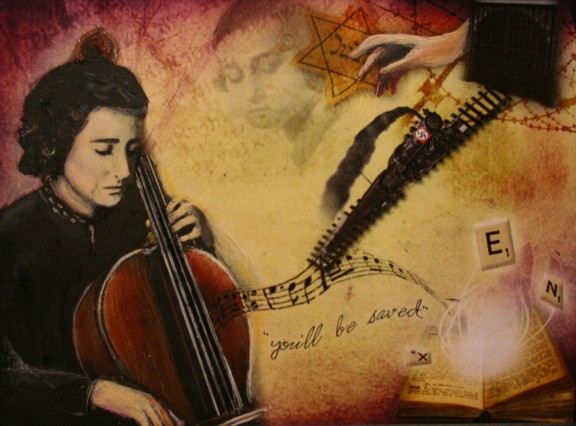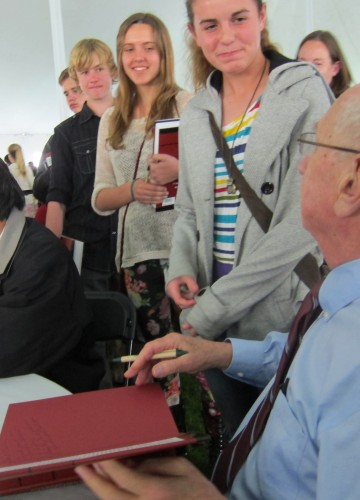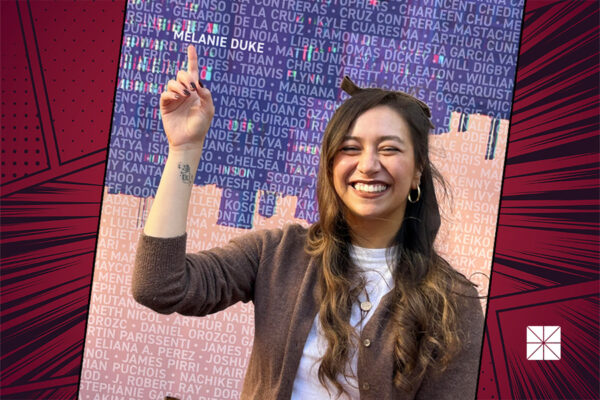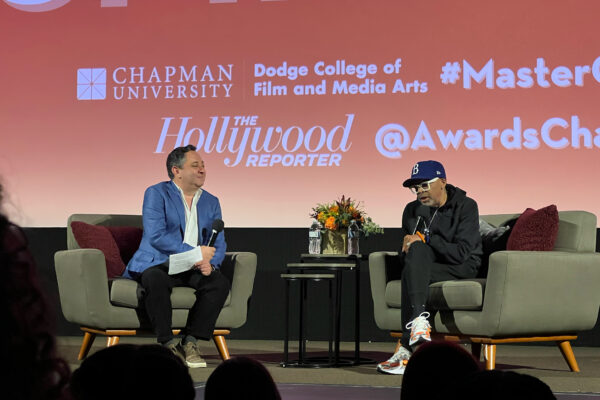
“Survivor’s Symphony” by Elizabeth Elder from Trabuco Hills High School won first place in the category of high school art. Elizabeth’s art was created in response to the survivor testimony of Anita Lasker-Wallfisch.
Someday in the future the story of a rainy March day at Chapman University in 2013 will come back to life for high school sophomore Katie Mukai.
That’s because after spending time meeting and chatting with several Holocaust survivors at the Fourteenth Annual Holocaust Art & Writing Contest, Katie has already pegged the experience as a memory she plans to share with the next generation.
“I actually get to interact with these people. My children won’t get to, so I will have to tell them,” the Irvine student said.
Such is the intent of the contest and get-together, offered each spring by the Rodgers Center for Holocaust Education in collaboration with
The “1939” Club
, one of the world’s largest and most active Holocaust survivor organizations. Hundreds of middle and high school students gathered on campus Friday, March 8, for the awards ceremony and reception celebrating this year’s contest winners.
With each passing year, the urgency of the task grows increasingly clear as the number of Holocaust survivors in attendance grows smaller. Even the theme of this year’s contest – Message to the Future – underscored the passing of time.

Holocaust survivor Jack Pariser shares a light moment with students attending the Holocaust Art & Writing reception. Pariser is autographing the students’ copies of “The Holocaust Chronicle: A History in Word and Pictures” presented to each student thanks to support from Louis Weber and Publications International.
“Learn from them, honor them, remember them, give them voice,” William Elperin, president of The “1939” Club, told the students gathered in Memorial Hall along with teachers, family members and community leaders. “Later in life you must share these principles, experiences and memories with your children, grandchildren and, yes, even your great grandchildren. Pay it forward.”
Focusing on themes central both to the Holocaust and contemporary ethical decisions facing the world today, the contest gives students the opportunity to create poetry, prose or artwork in response to survivors’ oral testimonies. This year more than 5,500 students from 10 states, as well as a foreign student from Chile, entered the contest. Following the awards ceremony students and survivors gathered in a large tent on the Bert C. Williams lawn while the Orange County Klezmers played and an informal lunch was served.
Carrying forward the memories and stories of those who survived the darkest chapters of World War II’s history is not the only goal, though. Jack Pariser, 83, has been attending the ceremony and reception since the contest began, always willing to meet with students and recount his experience in Nazi-occupied Poland. Pariser was 13 when he and his family made a daring escape from the Nazis and went into a series of hiding places, ultimately finding protection with a family that hid them in their barn.
But he says he tells students his history in hopes of impacting their future, where he hopes genocide will have no role.
“It’s something that needs to be done,” he says. “I’m not so much about the history. It is more for making sure it doesn’t happen again. And not enough of that is happening.”
Chapman Newsroom
Main Menu >
Media Contacts
Office of Public Relations
PR@chapman.edu
Strategic Marketing and Communications
1 University Drive
Orange, CA 92866
Contact Us
Strategic Marketing and Communications
1 University Drive
Orange, CA 92866
Contact Us
Newsroom Site
Your Header Sidebar area is currently empty. Hurry up and add some widgets.




Add comment